中考第一轮复习人教新目标七年级英语下册Unit5-Unit8词汇短语复习课件
文档属性
| 名称 | 中考第一轮复习人教新目标七年级英语下册Unit5-Unit8词汇短语复习课件 |  | |
| 格式 | pptx | ||
| 文件大小 | 193.5KB | ||
| 资源类型 | 试卷 | ||
| 版本资源 | 人教新目标(Go for it)版 | ||
| 科目 | 英语 | ||
| 更新时间 | 2025-02-15 14:26:01 | ||
图片预览

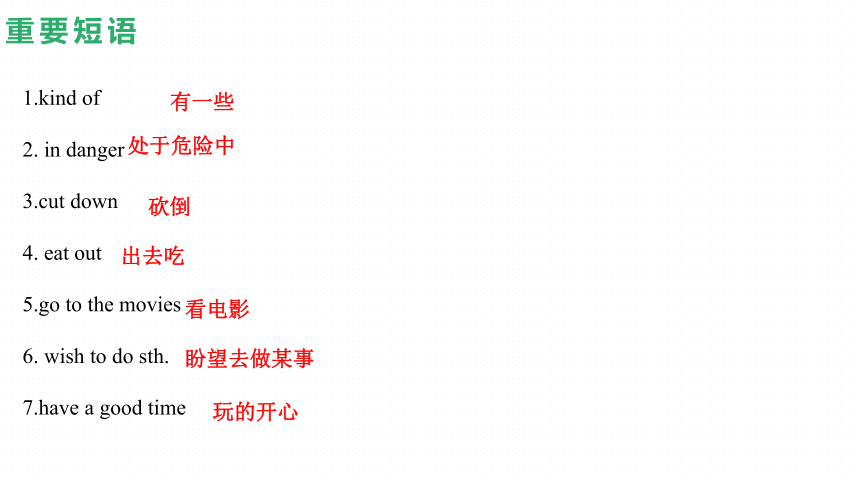

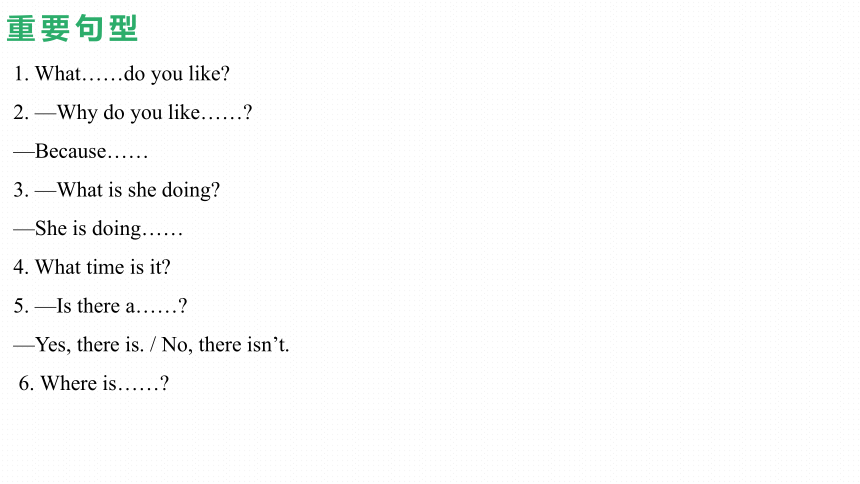

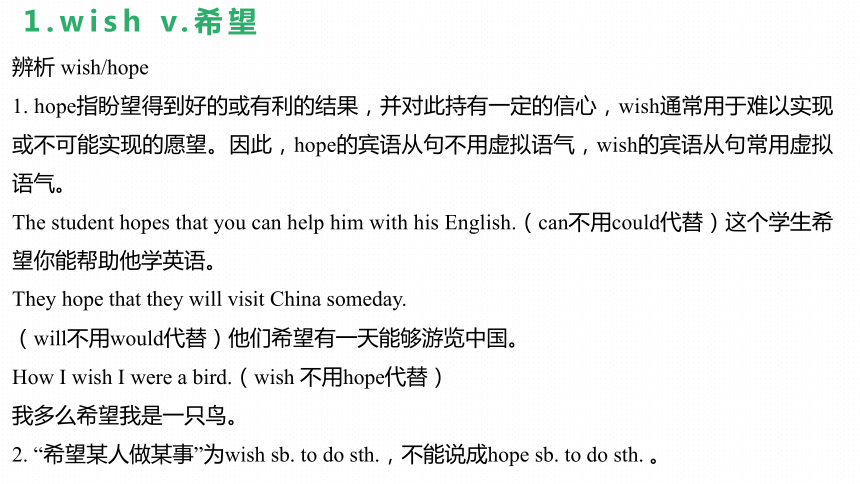

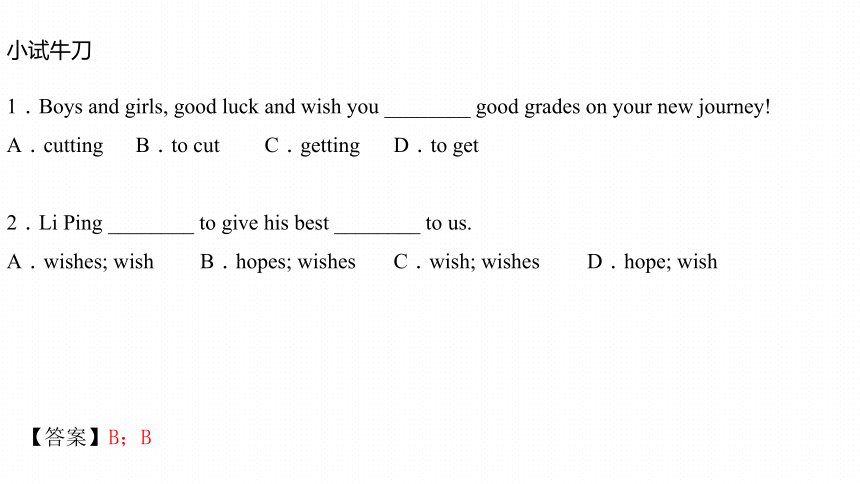
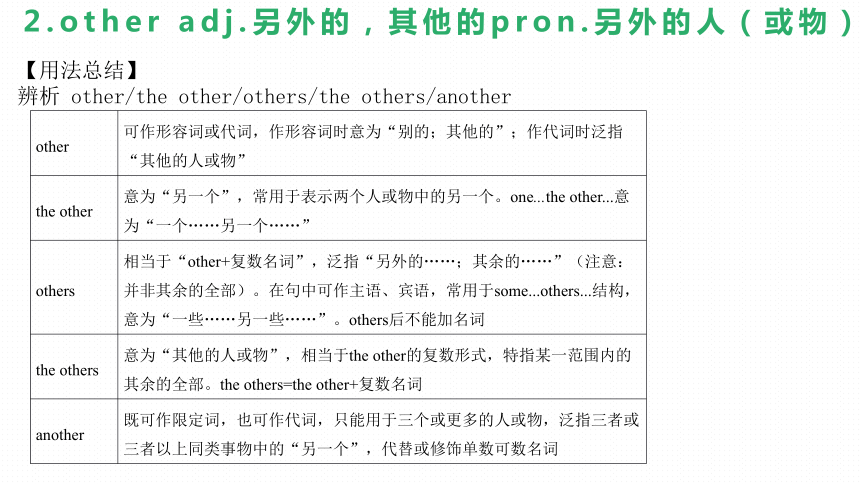
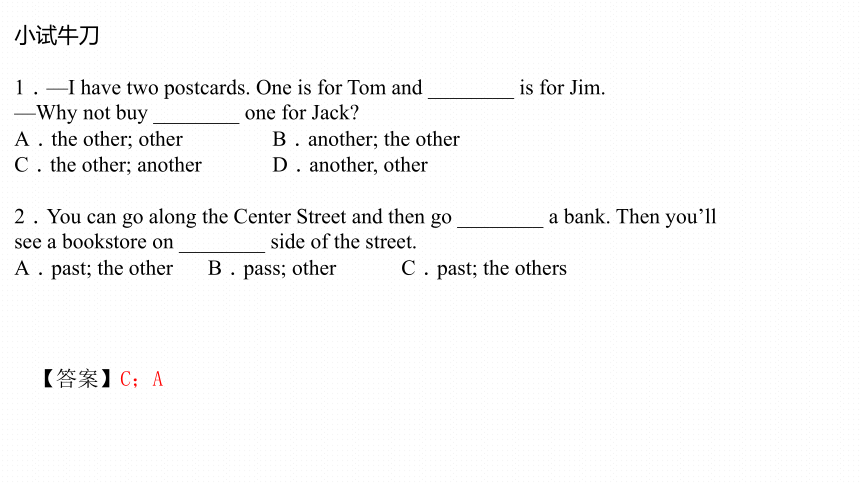


文档简介
(共32张PPT)
Unit 5-8词汇短语复习
七
最新人教版
下
单元总复习
/ 让教学更有效 高效备考| 英语学科
1.kind of
2. in danger
3.cut down
4. eat out
5.go to the movies
6. wish to do sth.
7.have a good time
重要短语
有一些
处于危险中
砍倒
玩的开心
盼望去做某事
出去吃
看电影
8. take a message
9.tell sb. to do sth.
10. turn left
11.go along
12. enjoy doing sth.
13. spend time
重要短语
留言
左转弯
享受做某事
告诉某人做某事
沿着……
花费时间
1. What……do you like
2. —Why do you like……
—Because……
3. —What is she doing
—She is doing……
4. What time is it
5. —Is there a……
—Yes, there is. / No, there isn’t.
6. Where is……
重要句型
Unit 5-8
语法汇集
七年级
最新人教版
下
/ 让教学更有效 高效备考| 英语学科
1.wish v.希望
辨析 wish/hope
1. hope指盼望得到好的或有利的结果,并对此持有一定的信心,wish通常用于难以实现或不可能实现的愿望。因此,hope的宾语从句不用虚拟语气,wish的宾语从句常用虚拟语气。
The student hopes that you can help him with his English.(can不用could代替)这个学生希望你能帮助他学英语。
They hope that they will visit China someday.
(will不用would代替)他们希望有一天能够游览中国。
How I wish I were a bird.(wish 不用hope代替)
我多么希望我是一只鸟。
2. “希望某人做某事”为wish sb. to do sth.,不能说成hope sb. to do sth. 。
1.wish v.希望
All the parents wish their children to be happy.(wish不用hope代替)所有的父母都希望他们的孩子能够快乐。
3. wish能接双宾语表示祝愿,而hope没有这样的用法。
I wish you a happy new year.
我祝你新年快乐。
I wish you a good journey.
我祝你旅途愉快。
4. 在答语中常用I hope so. /I hope not. 表达“希望如此/希望不是这样”。
5. 后跟动词不定式作宾语时,hope与wish可换用。
They hope to visit China. =They wish to visit China. 他们希望游览中国。
小试牛刀
1.Boys and girls, good luck and wish you ________ good grades on your new journey!
A.cutting B.to cut C.getting D.to get
2.Li Ping ________ to give his best ________ to us.
A.wishes; wish B.hopes; wishes C.wish; wishes D.hope; wish
【答案】B;B
2.other adj.另外的,其他的pron.另外的人(或物)
【用法总结】
辨析 other/the other/others/the others/another
other 可作形容词或代词,作形容词时意为“别的;其他的”;作代词时泛指“其他的人或物”
the other 意为“另一个”,常用于表示两个人或物中的另一个。one...the other...意为“一个……另一个……”
others 相当于“other+复数名词”,泛指“另外的……;其余的……”(注意:并非其余的全部)。在句中可作主语、宾语,常用于some...others...结构,意为“一些……另一些……”。others后不能加名词
the others 意为“其他的人或物”,相当于the other的复数形式,特指某一范围内的其余的全部。the others=the other+复数名词
another 既可作限定词,也可作代词,只能用于三个或更多的人或物,泛指三者或三者以上同类事物中的“另一个”,代替或修饰单数可数名词
小试牛刀
1.—I have two postcards. One is for Tom and ________ is for Jim.
—Why not buy ________ one for Jack
A.the other; other B.another; the other
C.the other; another D.another, other
2.You can go along the Center Street and then go ________ a bank. Then you’ll see a bookstore on ________ side of the street.
A.past; the other B.pass; other C.past; the others
【答案】C;A
【用法总结】
kind n. 种类,可构成如下短语:
1. a kind of 一种
2. all kinds of各种各样的
3. kind of(非正式)“稍微,有点儿”,多放在形容词前说明其程度。
【拓展】
kind adj. 和蔼的;好心肠的
be kind to sb. 对某人友好
be kind of sb. 某人是友好的
She is kind to me. 她对我很友好。
It's kind of him to help me. 他帮助我太好了。
3.kind的用法
练一练
1.—Let me help you.
—________
A.It’s very kind of you. B.You are welcome. C.That’s right.
2.—What’s that in the park
—It’s a baby monkey. It’s ________ interesting.
A.kind B.kind of C.kinds of D.a kind of
【答案】A;B
辨析 forget to do sth. /forget doing sth.
【用法总结】
二者虽都是由forget构成的短语,但含义不同。
1. forget to do sth. “忘记去做某事”,指事情还没做。
2. forget doing sth. “忘记做过某事”,指事情已经做过。
He forgot to close the door. 他忘记关门了。
He forgot closing the door. 他忘记已关了门。
4.forget to do sth.和forget doing sth.
练一练:
1.Don’t forget _________ the windows before you leave.
A.to close B.closing C.closed D.closes
2.—I’m sorry I ________ my homework at home this morning.
—It doesn’t matter. Don’t forget ________ it here tomorrow.
A.left; to take B.forgot; bringing C.left; to bring D.forgot; to bring
【答案】A;A
【用法总结】
辨析 spend/pay/cost/take
5.pay v.付费
spend 主语(人)+spend(s)+时间+doing sth.
主语(人)+spend(s)+钱/时间+on sth.
pay 主语(人)+pay(s)+钱+for sth.
cost 主语(物)+cost(s)+人+钱
take It+takes+人+时间+to do sth.
练一练:
1.After running for a long time, the animals have _______ that dangerous forest.
A.gone on B.gone through C.gone across
2.—Where is the hospital, please
—Look, there is a bridge ________ the river. Go________ the bridge and it’s just ________ the other side of the river.
A.over, across; on B.under, along; on
C.across; over; at D.over, through; at
【答案】B;A
【用法总结】
辨析 in front of/in the front of
6.in front of在……前面
in front of 表示“在……前面”,指在某一空间外部的前面
in the front of 表示“在……前部”,指在某一空间内的前部
练一练:
1.There is a teacher’s desk in ________ front of our classroom.
A.a B.an C.the D./
2.The man ________ a blue coat is standing ________ my father.
A.wears; in front of B.in; in front of
C.wears; in the front of D.in; in the front of
【答案】C ;B
【用法总结】
1. 作副词时,意为“努力地”。
We work hard all day.
我们整天都努力学习。
2. 作形容词时,意为“困难的”,同义词是difficult,反义词是easy。
It's a hard task. 这是一个艰难的任务。
【拓展】
hard作形容词时,还意为“硬的;坚固的”。
The rock is hard. 岩石很硬。
7.hard的用法
练一练
1.In my opinion, Tim studies ________ his sister.
A.not so hardly as B.as hardly as C.as hard as D.not as hardly as
2.Tom is a boy, he studies ____ and he ____plays with his friends.
A.hard-working; hard; hard B.working-hard; hardly; hardly
C.hard-working; hard; hardly D.working-hard; hardly; hard
【答案】C ;C
【用法总结】
8.现在进行时用法
用法 例句
表示现在(指说话人说话时)正在发生的动作或存在的状态 They are talking with friends.
他们正与朋友们谈话。
表示长期的或重复性的动作,说话时动作未必正在进行 We are studying pianos these days.
这些天我们在学习钢琴。
已经确定或安排好的将来的活动,常这样用的主要是come,go,run,leave,begin,arrive等短暂性动词 I'm leaving for a meeting in Hangzhou next week. 我下周将去杭州开会。
表示渐变的动作,这类动词有get,grow,become,turn,run,go,begin等 It's getting warmer and warmer.
天越来越暖和了。
以look,listen开头的句子提示动作正在进行,这时要用现在进行时 —Look! The children are dancing.
看!孩子们在跳舞。
—How happy they are!
他们多高兴啊!(辽宁丹东)
在时间、条件等状语从句中代替将来进行时 If I am sleeping when he comes,wake me up, please. 他来时如果我在睡觉,请叫醒我。
2. There be句型的主谓一致
There be句型中,be动词的形式与其后的主语保持一致,如果有多个并列主语时,与最接近be动词的主语一致。
例There is some water in the glass. 玻璃杯中有些水。
例There are two chairs and a computer in the room.
房间里有两把椅子和一台电脑。
练一练:
1.—Where is your little brother, Larry
—Look! He ________ up for the Halloween there.
A.dresses B.will dress C.dressed D.is dressing
2.No need to worry. We still have plenty of time. The train _________ here soon.
A.arrives B.is arriving C.was arriving
【答案】D;B
【用法总结】
9.There be句型的主谓一致
1. There be句型结构
句式 结构 例句
肯定句 There+be+主语+状语. There are eggs on the table. 桌子上有鸡蛋。
否定句 There+be+not+主语+状语. There is not a hospital in the village.
这个村子里没有医院。
一般疑问句 Be+there+主语+状语 Are there any books here 这里有书吗
练一练:
1.There ________ an umbrella and some raincoats behind the door. Take one with you.
A.are B.is C.have D.has
2.There __________ an annual school sports meeting in the school next Monday.
A.is going to have B.is going to is
C.will be D.will have
【答案】A ;C
Unit 5-8
基础练习
七年级
最新人教版
下
/ 让教学更有效 高效备考| 英语学科
1.—________ a lot of furniture in your house, Sarah
—Yes. I feel very comfortable in it.
A.Are there B.Is there C.Have got D.Has got
2.—Which shirt will you take, the white one or the black one
—I’ll take ________. One is for my husband and ________ for my son.
A.each; others B.all; another C.every; other D.both; the other
3.—I can’t find Sarah. Where is she
—She________for the coming football match on the playground.
A.trains B.will train C.is training D.trained
4.I don’t think this coat _____ as much as the one your cousin has just ______.
A.costs; paid B.spends; paid back C costs; paid for C.takes; spent
5.Lily is in front of Sam, so Sam is ________ Lily.
A.in front of B.next to C.on the left of D.behind
【答案】B;D;C;C;D
一、单项选择
二、阅读理解
Some people have a very poor sense(感觉)of direction. Unluckily, I am one of them. I have visited a place many times but I may still get lost there the next time.
When I was a little girl, I never dared ask strangers the way. And so I used to walk round in circle and hope that by chance I would get to the place I was going to.
Now, I am no longer too shy to ask people for directions, but I often receive helpless or even wrong information. So I try to avoid giving people wrong directions. If anyone asks me the way somewhere, I would say, “Sorry, I am a stranger here.”
Once on my way to work I was stopped by a man. He asked me if I could tell him the way to the Friendship Building. I gave him my usual reply. But just as I walked on only a few steps, I realized that he had asked the way to my office building. However, I had no time to turn back and look for him. I was rushing to meet with someone at my office and I didn’t want to keep him waiting.
When I just got to my office, the secretary showed in the man who had asked me for directions. Imagine how embarrassed I was and how surprised he was when
we saw each other at the first sight!
1.What does the underlined word mean in paragraph 2
A.有目的地 B.碰巧 C.错误地 D.匆忙地
2.Why would the writer say “Sorry, I am a stranger here.”, when someone asks her the way somewhere
A.Because the writer is afraid of giving people wrong directions.
B.Because the writer doesn’t want to tell strangers.
C.Because the writer has no time.
D.Because the writer is a stranger here.
3.The Friendship Building is the place where the writer ________.
A.lives B.studies C.works D.teaches
4.The underlined word “embarrassed” in the last paragraph means “________”.
A.困惑的 B.尴尬的 C.激动的 D.拮据的
5.Which of the following is TRUE according to the passage
A.The writer is too shy to give others directions.
B.The man was quite nervous when he saw the writer.
C.The writer never got lost when she was young.
D.The writer has a very poor sense of directions
【答案】1.B 2.A 3.C 4.B 5.D
4.The underlined word “embarrassed” in the last paragraph means “________”.
A.困惑的 B.尴尬的 C.激动的 D.拮据的
5.Which of the following is TRUE according to the passage
A.The writer is too shy to give others directions.
B.The man was quite nervous when he saw the writer.
C.The writer never got lost when she was young.
D.The writer has a very poor sense of directions
【答案】1.B 2.A 3.C 4.B 5.D
Asia is known for the “rice bowl” cultures. Especially for these 1 (country) like China, Japan, Korea and Vietnam, food is usually eaten with chopsticks.
Chopsticks have two long, thin pieces of wood or bamboo. They can also be made 2 plastic, animal bone or metal. Sometimes chopsticks are quite artistic. Truly elegant chopsticks might be made of gold and silver with Chinese characters. Skilled workers also combine (结合) various hardwoods and metal (金属) 3 (create) special designs.
The Chinese 4 (use) chopsticks for five thousand years. People probably cooked their food in large pots, using twigs (树枝) to remove it. Over time, as the population 5 (grow), people began cutting food into small pieces. As 6 result, it would cook more quickly. Food in small pieces could be eaten 7 (easy) with twigs which gradually turned into chopsticks.
According 8 the great Chinese scholar Confucius, who lived from roughly 551 to 479 B. C. influenced the 9 (develop) of chopsticks. Confucius believed 10 (knife) would remind people of killings and were too violent for use at the table.
Chopsticks are not used everywhere in Asia. In India, for example, most people traditionally eat with their hands.
答案:1.countries 2.of 3.to create 4.have used 5.grew 6.a 7.easily 8.to 9.development 10.knives
Thank you!
Unit 5-8词汇短语复习
七
最新人教版
下
单元总复习
/ 让教学更有效 高效备考| 英语学科
1.kind of
2. in danger
3.cut down
4. eat out
5.go to the movies
6. wish to do sth.
7.have a good time
重要短语
有一些
处于危险中
砍倒
玩的开心
盼望去做某事
出去吃
看电影
8. take a message
9.tell sb. to do sth.
10. turn left
11.go along
12. enjoy doing sth.
13. spend time
重要短语
留言
左转弯
享受做某事
告诉某人做某事
沿着……
花费时间
1. What……do you like
2. —Why do you like……
—Because……
3. —What is she doing
—She is doing……
4. What time is it
5. —Is there a……
—Yes, there is. / No, there isn’t.
6. Where is……
重要句型
Unit 5-8
语法汇集
七年级
最新人教版
下
/ 让教学更有效 高效备考| 英语学科
1.wish v.希望
辨析 wish/hope
1. hope指盼望得到好的或有利的结果,并对此持有一定的信心,wish通常用于难以实现或不可能实现的愿望。因此,hope的宾语从句不用虚拟语气,wish的宾语从句常用虚拟语气。
The student hopes that you can help him with his English.(can不用could代替)这个学生希望你能帮助他学英语。
They hope that they will visit China someday.
(will不用would代替)他们希望有一天能够游览中国。
How I wish I were a bird.(wish 不用hope代替)
我多么希望我是一只鸟。
2. “希望某人做某事”为wish sb. to do sth.,不能说成hope sb. to do sth. 。
1.wish v.希望
All the parents wish their children to be happy.(wish不用hope代替)所有的父母都希望他们的孩子能够快乐。
3. wish能接双宾语表示祝愿,而hope没有这样的用法。
I wish you a happy new year.
我祝你新年快乐。
I wish you a good journey.
我祝你旅途愉快。
4. 在答语中常用I hope so. /I hope not. 表达“希望如此/希望不是这样”。
5. 后跟动词不定式作宾语时,hope与wish可换用。
They hope to visit China. =They wish to visit China. 他们希望游览中国。
小试牛刀
1.Boys and girls, good luck and wish you ________ good grades on your new journey!
A.cutting B.to cut C.getting D.to get
2.Li Ping ________ to give his best ________ to us.
A.wishes; wish B.hopes; wishes C.wish; wishes D.hope; wish
【答案】B;B
2.other adj.另外的,其他的pron.另外的人(或物)
【用法总结】
辨析 other/the other/others/the others/another
other 可作形容词或代词,作形容词时意为“别的;其他的”;作代词时泛指“其他的人或物”
the other 意为“另一个”,常用于表示两个人或物中的另一个。one...the other...意为“一个……另一个……”
others 相当于“other+复数名词”,泛指“另外的……;其余的……”(注意:并非其余的全部)。在句中可作主语、宾语,常用于some...others...结构,意为“一些……另一些……”。others后不能加名词
the others 意为“其他的人或物”,相当于the other的复数形式,特指某一范围内的其余的全部。the others=the other+复数名词
another 既可作限定词,也可作代词,只能用于三个或更多的人或物,泛指三者或三者以上同类事物中的“另一个”,代替或修饰单数可数名词
小试牛刀
1.—I have two postcards. One is for Tom and ________ is for Jim.
—Why not buy ________ one for Jack
A.the other; other B.another; the other
C.the other; another D.another, other
2.You can go along the Center Street and then go ________ a bank. Then you’ll see a bookstore on ________ side of the street.
A.past; the other B.pass; other C.past; the others
【答案】C;A
【用法总结】
kind n. 种类,可构成如下短语:
1. a kind of 一种
2. all kinds of各种各样的
3. kind of(非正式)“稍微,有点儿”,多放在形容词前说明其程度。
【拓展】
kind adj. 和蔼的;好心肠的
be kind to sb. 对某人友好
be kind of sb. 某人是友好的
She is kind to me. 她对我很友好。
It's kind of him to help me. 他帮助我太好了。
3.kind的用法
练一练
1.—Let me help you.
—________
A.It’s very kind of you. B.You are welcome. C.That’s right.
2.—What’s that in the park
—It’s a baby monkey. It’s ________ interesting.
A.kind B.kind of C.kinds of D.a kind of
【答案】A;B
辨析 forget to do sth. /forget doing sth.
【用法总结】
二者虽都是由forget构成的短语,但含义不同。
1. forget to do sth. “忘记去做某事”,指事情还没做。
2. forget doing sth. “忘记做过某事”,指事情已经做过。
He forgot to close the door. 他忘记关门了。
He forgot closing the door. 他忘记已关了门。
4.forget to do sth.和forget doing sth.
练一练:
1.Don’t forget _________ the windows before you leave.
A.to close B.closing C.closed D.closes
2.—I’m sorry I ________ my homework at home this morning.
—It doesn’t matter. Don’t forget ________ it here tomorrow.
A.left; to take B.forgot; bringing C.left; to bring D.forgot; to bring
【答案】A;A
【用法总结】
辨析 spend/pay/cost/take
5.pay v.付费
spend 主语(人)+spend(s)+时间+doing sth.
主语(人)+spend(s)+钱/时间+on sth.
pay 主语(人)+pay(s)+钱+for sth.
cost 主语(物)+cost(s)+人+钱
take It+takes+人+时间+to do sth.
练一练:
1.After running for a long time, the animals have _______ that dangerous forest.
A.gone on B.gone through C.gone across
2.—Where is the hospital, please
—Look, there is a bridge ________ the river. Go________ the bridge and it’s just ________ the other side of the river.
A.over, across; on B.under, along; on
C.across; over; at D.over, through; at
【答案】B;A
【用法总结】
辨析 in front of/in the front of
6.in front of在……前面
in front of 表示“在……前面”,指在某一空间外部的前面
in the front of 表示“在……前部”,指在某一空间内的前部
练一练:
1.There is a teacher’s desk in ________ front of our classroom.
A.a B.an C.the D./
2.The man ________ a blue coat is standing ________ my father.
A.wears; in front of B.in; in front of
C.wears; in the front of D.in; in the front of
【答案】C ;B
【用法总结】
1. 作副词时,意为“努力地”。
We work hard all day.
我们整天都努力学习。
2. 作形容词时,意为“困难的”,同义词是difficult,反义词是easy。
It's a hard task. 这是一个艰难的任务。
【拓展】
hard作形容词时,还意为“硬的;坚固的”。
The rock is hard. 岩石很硬。
7.hard的用法
练一练
1.In my opinion, Tim studies ________ his sister.
A.not so hardly as B.as hardly as C.as hard as D.not as hardly as
2.Tom is a boy, he studies ____ and he ____plays with his friends.
A.hard-working; hard; hard B.working-hard; hardly; hardly
C.hard-working; hard; hardly D.working-hard; hardly; hard
【答案】C ;C
【用法总结】
8.现在进行时用法
用法 例句
表示现在(指说话人说话时)正在发生的动作或存在的状态 They are talking with friends.
他们正与朋友们谈话。
表示长期的或重复性的动作,说话时动作未必正在进行 We are studying pianos these days.
这些天我们在学习钢琴。
已经确定或安排好的将来的活动,常这样用的主要是come,go,run,leave,begin,arrive等短暂性动词 I'm leaving for a meeting in Hangzhou next week. 我下周将去杭州开会。
表示渐变的动作,这类动词有get,grow,become,turn,run,go,begin等 It's getting warmer and warmer.
天越来越暖和了。
以look,listen开头的句子提示动作正在进行,这时要用现在进行时 —Look! The children are dancing.
看!孩子们在跳舞。
—How happy they are!
他们多高兴啊!(辽宁丹东)
在时间、条件等状语从句中代替将来进行时 If I am sleeping when he comes,wake me up, please. 他来时如果我在睡觉,请叫醒我。
2. There be句型的主谓一致
There be句型中,be动词的形式与其后的主语保持一致,如果有多个并列主语时,与最接近be动词的主语一致。
例There is some water in the glass. 玻璃杯中有些水。
例There are two chairs and a computer in the room.
房间里有两把椅子和一台电脑。
练一练:
1.—Where is your little brother, Larry
—Look! He ________ up for the Halloween there.
A.dresses B.will dress C.dressed D.is dressing
2.No need to worry. We still have plenty of time. The train _________ here soon.
A.arrives B.is arriving C.was arriving
【答案】D;B
【用法总结】
9.There be句型的主谓一致
1. There be句型结构
句式 结构 例句
肯定句 There+be+主语+状语. There are eggs on the table. 桌子上有鸡蛋。
否定句 There+be+not+主语+状语. There is not a hospital in the village.
这个村子里没有医院。
一般疑问句 Be+there+主语+状语 Are there any books here 这里有书吗
练一练:
1.There ________ an umbrella and some raincoats behind the door. Take one with you.
A.are B.is C.have D.has
2.There __________ an annual school sports meeting in the school next Monday.
A.is going to have B.is going to is
C.will be D.will have
【答案】A ;C
Unit 5-8
基础练习
七年级
最新人教版
下
/ 让教学更有效 高效备考| 英语学科
1.—________ a lot of furniture in your house, Sarah
—Yes. I feel very comfortable in it.
A.Are there B.Is there C.Have got D.Has got
2.—Which shirt will you take, the white one or the black one
—I’ll take ________. One is for my husband and ________ for my son.
A.each; others B.all; another C.every; other D.both; the other
3.—I can’t find Sarah. Where is she
—She________for the coming football match on the playground.
A.trains B.will train C.is training D.trained
4.I don’t think this coat _____ as much as the one your cousin has just ______.
A.costs; paid B.spends; paid back C costs; paid for C.takes; spent
5.Lily is in front of Sam, so Sam is ________ Lily.
A.in front of B.next to C.on the left of D.behind
【答案】B;D;C;C;D
一、单项选择
二、阅读理解
Some people have a very poor sense(感觉)of direction. Unluckily, I am one of them. I have visited a place many times but I may still get lost there the next time.
When I was a little girl, I never dared ask strangers the way. And so I used to walk round in circle and hope that by chance I would get to the place I was going to.
Now, I am no longer too shy to ask people for directions, but I often receive helpless or even wrong information. So I try to avoid giving people wrong directions. If anyone asks me the way somewhere, I would say, “Sorry, I am a stranger here.”
Once on my way to work I was stopped by a man. He asked me if I could tell him the way to the Friendship Building. I gave him my usual reply. But just as I walked on only a few steps, I realized that he had asked the way to my office building. However, I had no time to turn back and look for him. I was rushing to meet with someone at my office and I didn’t want to keep him waiting.
When I just got to my office, the secretary showed in the man who had asked me for directions. Imagine how embarrassed I was and how surprised he was when
we saw each other at the first sight!
1.What does the underlined word mean in paragraph 2
A.有目的地 B.碰巧 C.错误地 D.匆忙地
2.Why would the writer say “Sorry, I am a stranger here.”, when someone asks her the way somewhere
A.Because the writer is afraid of giving people wrong directions.
B.Because the writer doesn’t want to tell strangers.
C.Because the writer has no time.
D.Because the writer is a stranger here.
3.The Friendship Building is the place where the writer ________.
A.lives B.studies C.works D.teaches
4.The underlined word “embarrassed” in the last paragraph means “________”.
A.困惑的 B.尴尬的 C.激动的 D.拮据的
5.Which of the following is TRUE according to the passage
A.The writer is too shy to give others directions.
B.The man was quite nervous when he saw the writer.
C.The writer never got lost when she was young.
D.The writer has a very poor sense of directions
【答案】1.B 2.A 3.C 4.B 5.D
4.The underlined word “embarrassed” in the last paragraph means “________”.
A.困惑的 B.尴尬的 C.激动的 D.拮据的
5.Which of the following is TRUE according to the passage
A.The writer is too shy to give others directions.
B.The man was quite nervous when he saw the writer.
C.The writer never got lost when she was young.
D.The writer has a very poor sense of directions
【答案】1.B 2.A 3.C 4.B 5.D
Asia is known for the “rice bowl” cultures. Especially for these 1 (country) like China, Japan, Korea and Vietnam, food is usually eaten with chopsticks.
Chopsticks have two long, thin pieces of wood or bamboo. They can also be made 2 plastic, animal bone or metal. Sometimes chopsticks are quite artistic. Truly elegant chopsticks might be made of gold and silver with Chinese characters. Skilled workers also combine (结合) various hardwoods and metal (金属) 3 (create) special designs.
The Chinese 4 (use) chopsticks for five thousand years. People probably cooked their food in large pots, using twigs (树枝) to remove it. Over time, as the population 5 (grow), people began cutting food into small pieces. As 6 result, it would cook more quickly. Food in small pieces could be eaten 7 (easy) with twigs which gradually turned into chopsticks.
According 8 the great Chinese scholar Confucius, who lived from roughly 551 to 479 B. C. influenced the 9 (develop) of chopsticks. Confucius believed 10 (knife) would remind people of killings and were too violent for use at the table.
Chopsticks are not used everywhere in Asia. In India, for example, most people traditionally eat with their hands.
答案:1.countries 2.of 3.to create 4.have used 5.grew 6.a 7.easily 8.to 9.development 10.knives
Thank you!
